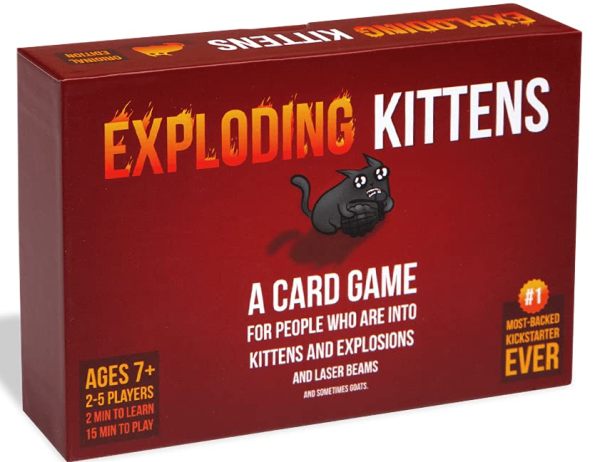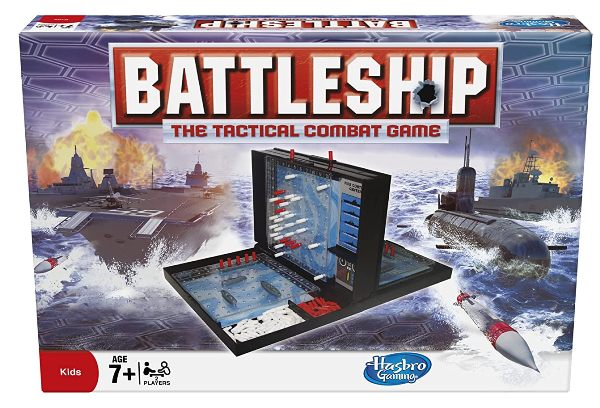Keep kids away from screens with board games! Check out our list of Best Board Games for Kids, including picks for all ages and interests.
What’s one thing you’d like to change in your child’s daily routine?
Most parents would reply to this with ‘screen time’. With kids attending classes online and using the computer or laptop for school work, they’re already going beyond the recommended amount of screen time per day. With excessive screen time increasing the risk of health issues like vision problems, obesity and anxiety, we’d like our kids to spend their free time on non-screen activities.
One good option is to get them toys that encourage physical activity, which can be used indoors as well. However, if you’d like to bring back the magic of your childhood and share it with your kids, there can’t be anything better than a board game!
Remember how much fun we had with board games? Especially during summer holidays, when we got together with our cousins and played games late into the night. There would be lots of excitement, someone would invariably cheat and then a good deal of yelling would ensue.
Besides the fun, board games have many other benefits for children, whatever their age. Here is a look at some of them briefly.
Benefits of Board Games for Kids
- Keeps kids entertained for a good while and away from screens
- Helps younger kids learn colors and numbers
- Encourages hand-eye co-ordination in young children
- Makes kids focus on a single task, increasing attention span
- Improves basic math skills for all ages
- Encourages critical thinking and problem solving, especially in strategy games
- Teaches kids how to take turns and follow rules
- Promotes team work as players work together to win
- Teaches kids how to lose graciously
- Shows kids that life can be unpredictable like a board game
- Provides a bonding opportunity for the whole family
I’m sure you didn’t think board games could achieve so much for our kids! Well, now that we know board games are great for kids, here are top picks for board games for kids. There’s something here for kids of all ages, even as young as 2!
25 Best Board Games for Kids of All Ages
1. Button, Button, Belly Button, 2+
This is the perfect game to introduce your little one to the world of board games! The game comes with buttons and belly buttons, and cards tell the player whether he or she should match the card with a button or just show their own belly buttons! This is an adorable game that doesn’t really have winners or losers. It helps toddlers understand the concept of taking turns and also encourages them to try matching.
2. Where’s Bear, 2+
This game is a slightly advanced version of Peek-a-boo – played with a bear! Toddlers of this age enjoy stacking and playing with boxes, and each box in this game represents a room in Bear’s house. However, the child has to guess which room Bear is in! This is a lot of fun for siblings to play with little ones.
3. SET Junior, 3+
SET Junior is based on SET, the award-winning game. A SET constitutes three cards that have some similarity or none at all. It’s a quick game as each player hurries to call out their set and grab the cards. It encourages kids to think and act fast, while also developing spatial reasoning and pattern recognition.
4. OranguTwang, 4+
The aim of this game is exactly as it sounds – you have prevent the Orangutan from going ‘twang’! The set includes palm trees with a branch in between them, where the orangutan hangs from. You take turns to roll the dice to find out which fruit you hang on the orangutan. The aim is to hang it carefully so that the ape doesn’t bounce off the branch, spilling everything. Yes, it’s as fun as it looks!
5. Hungry Hungry Hippos, 4+
This is a fun game for early school goers where every player has a hippo of their own. All you need to do is to make your hippo ‘eat’ as many marbles as possible – that’s it! But it’s not as easy as it sounds; getting the hippo to open his mouth in time to grab the marbles can take some effort. It offers the right kind of challenge in developing hand eye coordination in this age group.
6. Yeti in My Spaghetti, 4+
Kids are often scolded about playing with food, but this game is an exception! A yeti is placed atop a bowl of pretend spaghetti at the beginning of the game. Then each player takes turns to remove a noodle, making sure the yeti is not disturbed. If you cause the Yeti to fall into the bowl, you’re out! This is a game that guarantees a lot of fun time with children of all ages.
7. Qwirkle, 5+
This is an interesting game that you can make as simple or as complicated as you like. Each player gets six blocks at the beginning of the game. They place one block at each turn, matching the existing block on the table with respect to color or shape. There is a system to calculate points but you can skip this for younger children who are just learning the rules of the game. This is a great game to help kids with matching colors and shapes.
8. Jenga, 5+
Jenga is a classic game that everyone must have in their homes! This game has nothing but simple wooden blocks, but it proves that that’s all you need to have a good amount of fun! The rules are basic enough, you remove a block from the tower at every turn and place it on the top, making sure the whole thing doesn’t come crashing down. However, when it does, be ready for lots of laughs! Kids can learn lessons about balance and symmetry as they try to pull out the right bricks.
9. Spot It!, 6+
Spot It is a card game that is really easy to play but loads of fun. You need to spot the common image on two cards before the rest. Each card in the deck is unique, making it rather tricky to match! Kids have to think fast and it’s a great exercise for concentration and visual perception. This game is also great to take around as it’s small enough to fit in a purse.
10. Guess Who?, 6+
This is a game we’re familiar with, where we assume the character of a person and answer yes or no to the questions asked by others. Guess Who? follows a similar pattern, except we get a face with different features and questions are asked to identify the exact character. It encourages kids to understand the concept of elimination and putting together data to deduce valuable information.
11. Connect 4, 6+
Connect 4 is a classic game we’re all familiar with, especially if we’ve played Tic Tac Toe as a kid. The only difference here is that everything is vertical! You drop coins into the gaps to create a full line of four vertically, horizontally or diagonally. It requires a bit of strategic planning, patience and concentration – all valuable skills to develop!
12. Exploding Kittens, 7+
The name of this game sounds rather violent, but it’s actually a lot of fun. You just keep drawing cards till a player draws one with an exploding kitten and that’s it – they lose the game! The cards have some hilarious stuff on them which will have kids giggling throughout. To truly enjoy the cards, kids need to be able to read independently.
13. Cluedo, 7+
This is a game many of us have played and enjoyed many years ago. If your child enjoys mysteries and spy stuff, he or she’ll love this game. A murder has occurred in some room in the mansion, and it is up to us to figure out who did it and with what weapon. This game requires a good amount of strategic thinking and deduction skills on the players’ part.
14. Battleship, 7+
Battleship is a game that was launched a long time ago and revised many times over the years. The game consists of two players, one of whom deploys ships on a secret grid. The opponent calls out a location on the grid to shoot and the first player says if it’s a hit or a miss. First person to shoot down all the enemy battleships wins. It’s a game that requires a fair deal of concentration as players try to eliminate possible locations and focus on the rest. An excellent strategy game for school going children.
15. Blokus, 7+
If you’ve played Tetris, you’ll be able to relate to Blokus too. The game works similarly, as players add blocks one by one in a clockwise manner around the board. The remaining pieces with each player gives them a negative score and the highest score wins. This is great for spatial reasoning and logical thinking. Calculating the score with negative numbers also works as a good Math exercise.
16. Googly Eyes Game, 7+
This is a game that adds a layer of silliness to the traditional Pictionary game. Here also, you get a clue and you have to draw it while your teammates guess what it is. However, you have to draw while wearing vision altering glasses, which can have some hilarious results! The rules of the game are a little more complex than Pictionary, but the fun makes it worth it!
17. Yahtzee, 8+
Dice is often used as a part of a game, but here the dice is the game! There are 5 dice and 13 categories, and each player gets a 3 rolls of the dice hoping to get 1 category. Each category has a score and the total score is calculated when all payers have gone through a round of entering zero for each category.
18. Scrabble, 8+
I’m pretty sure this classic game needs no introduction and it was my personal favorite growing up – still is, in fact! This is an excellent game to build vocabulary and improves memory and recall. It also builds Math skills as you calculate double and triple word and letter scores. If this seems too complex for your kids, there is also a junior Scrabble version.
19. Rush Hour, 8+
Does your child long for the day he or she can drive through the road amidst traffic? Well, this game should satisfy them for now! Rush Hour is award winning game that is popular among kids and adults alike. The set includes cards that show where to place the vehicles. Each player must then slide the cars in different directions to clear traffic. A great game for developing problem solving skills in growing children.
20. Monopoly, 8+
When a game started in 1935 is popular even today and has new versions coming out every often, you know it’s an evergreen classic! Monopoly is probably the most popular family board game out there and it can have people hooked. The rules of the game are a little complicated as it involves buying and selling property, while also following instructions on the Chance and Community Chest cards.
21. Ticket to Ride, 8+
This is the Europe version of the original Ticket to Ride game. Here you need to connect the cities of Europe by train. This is done by building routes, matching train cards and adding engines. The game helps to learn about the geography of the land, long term planning as well as strategic planning. It’s easy enough for kids to understand and will keep them engaged for a good while.
22. Catan, 8+
Catan is the perfect game for a long weekend or when you want an activity that will take an hour or more. The aim of the game is to build a settlement with roads and cities, while preventing other players from doing the same! The game is designed in a manner that it is different every time you play, which makes it interesting with the potential for many hours of play. The rules are a little complex and may take a while to understand, but once you get it, there’s no going back!
The name of this game is pretty unique, and so is the game itself! This is essentially a card game, but requires players to act fast and speak fast too! The rules are simple enough, and even young kids can understand them easily. There are some special actions to perform which add to the silliness to the game and which is probably what’ll be the most fun!
24. The Game of Life, 9+
Did you know that this game was first invented in 1860? Yes, it’s that old, but is still running strong! As the name suggests, the game is about following different paths in life, traveling in a car and following a spinning wheel in the center. The person who finishes the game with the most money wins. This is recommended for older kids so that we can explain to them that making money shouldn’t seem like life’s end goal, although it is so for the game.
25. Scotland Yard, 10+
Scotland Yard is an award winning game, and with good reason. The game requires one player to be Mr. X, and the others detectives looking for him. The detectives team up and their moves are different from those of Mr. X. In fact the are quite a few rules to learn for this game, but it will be an interesting challenge for older kids.









































Leave a Reply